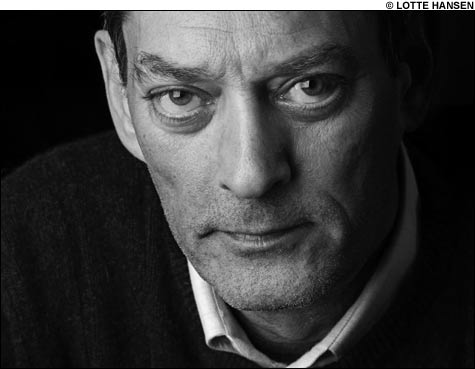
AWAKE: Auster’s protagonist recognizes that stories, alternative worlds, movies, and words all offer only illusory escape. |
| Man in the Dark | By Paul Auster | Henry Holt | 192 Pages | $23 |
So here he goes again, the writer known as Paul Auster, starting yet another novel, this time with the words “I am alone in the dark.” Kind of sums it all up, doesn’t it? But as Samuel Beckett might have told him, you must go on, and so he does much as he has done in several books so far, spinning out a novel within a novel, a literary detective story without resolution, a page turner that just seems to run out of pages, with a glimpse at the end, perhaps, of some light.August Brill, Auster’s persona, age 72 and incapacitated by a car accident, sits alone in a bedroom in his house in Vermont, tortured by old memories and current pains, unable to sleep. His wife, Sonia, is dead, his daughter Miriam mopes upstairs after being dumped by her husband, and his granddaughter Katya mourns the heinous murder of her boyfriend. A retired book critic, Brill decides to dispel the demons by inventing his own story. In it a 30-year-old magician from Queens with the concrete-sounding name of Owen Brick wakes up to find himself in a hole in the ground in a world that is much like the one he appears to have left, but with significant differences.
The good news is that in this world 9/11 and the Iraq War never happened. The bad news is that the country split apart in a bloody civil war following the disputed presidential election of 2000 and millions have died in the fighting. Brick, meanwhile, has been summoned from his world, or rather Brill’s, or rather Auster’s, to put an end to the war by assassinating the person responsible. That person (and this will be a spoiler for anyone who has not read any of Paul Auster’s work) is August Brill (and not Mr. Blank, as Brick had been told, the protagonist of Auster’s previous novel, Travels in the Scriptorium). Brill, as we know, has been writing the story in which this alternative history has been happening.
How is this possible? To explain it, a character in Brill’s novel refers Brick to the 16th-century Italian philosopher Giordano Bruno, who was burned at the stake for arguing that “if God is infinite. . . . then there must be an infinite number of worlds.” That may be so, but it also seems that Brill has been reading a lot of Philip K. Dick novels, if not the works of Paul Auster.
At any rate, Brill’s exercise proves, for a time, diverting for him and compelling for the reader, even though bits of the framing novel keep poking through. Like the discussion Brill has with Katya about some of the movies she’s been watching to blot out the memory of her boyfriend’s death. Their analysis of La grande illusion and Tokyo Story sounds a little like Film Appreciation 101. (Auster’s cinema æsthetics were much more acute in Oracle Night.) But Brill’s concern about Katya’s viewing obsession reflects his own malady. He recognizes that stories, alternative worlds, movies, and words all offer illusory escape from realities that are unacceptable. Realities like the image of the burning Twin Towers, never directly referred to in Man in the Dark, but always looming. And another image that is as horrific and, for the characters of this story, far more intimate and terrible.